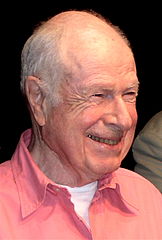
I read Peter Brook’s collection of essays some time ago, but – most unfairly – decided to write a post about John Barton first. This is not because Brook was any less interesting (if anything, he’s the opposite), but rather because of the usual lack of world and time this blog constantly suffers under.
The Shifting Point is a hard book to read, presenting fragments of Brook’s thinking from four different decades, so you never know when you’ll be hit by a striking observation (like French being “the language least suited” for the purpose of translating Shakespeare) before it’s gone again and Brook is off discussing something else entirely. A few passages stand out for me, because of my own obsessions, and I’ll try to connect them here, but I expect other readers – because of the nature of this volume – would have a very different impression of it.
The two passages are both about actors. First, from a section entitlted “A Lost Art”:
It is not enough for the actor to find his truth – it is not enough for him to be open blindly to impulses from sources inside himself that he cannot understand. He needs an understanding that must in turn ally itself to a wider mystery. He can only find this link through a tremendous awe and respect for what we call form. This form is the movement of the text, this form is his own individual way of capturing that movement.
From this observation, Brook concludes that an actor must “ be both distant and present”, where “Distance is a commitment to total meaning” and “presence is a total commitment to the living moment”. I liked these thoughts because they strike me as very eighteenth-century: the idea that the actor must be plunged in his role and yet paradoxically detached from it, aware of the form and wider mystery, is the core observation of Diderot’s Paradoxe and an implicit contradiction in other writing of the period too, like that of John Hill. What Brook adds, two centuries on, is a kind of mystic sense of flux: the “awe”, the “mystery” and the idea that text itself has “movement”.
My second selection appears in what is the longest part of Brook’s text, a series of anecdotes describing his troupe’s travels across Africa. Reflecting on what the experience taught him, Brook considers the importance of audience expectations.
A very interesting thing is to strike a point where the mental habits have not been formed that accept the linear development of a story, so that, in fact, events are received as a set of disconnected impressions. Therefore, they are suddenly taken really for what they are. At that moment the values change, because at that moment one can see that maybe their only living value resides in what the sequence is building up to, while second for second they’re not all that interesting. At that moment the actor senses that the story is nothing to lean on, because if, as the old man walking on, he does not produce something complete in its own right, the attentiveness of the people surrounding it will be in no way heightened.
Although it would be a forced comparison at best, Brook’s description of how his audience received his actors’ performances as “a set of disconnected impression” made me think of eighteenth-century practice, where theatregoers came to see the ‘points’ of the play. These points, like the appearance of the Ghost, the madness of Ophelia, or Hamlet succumbing to poison (to take examples all from one play), were appreciated by the public as distinct moments, part of a plot but also much more as standalone vignettes than nowadays. Not so different then from these African audiences’ attitudes. Would then, I wonder, a similar conclusion to Brook’s follow? Is it always true that when performing in an environment where “the story is nothing to lean on”, the actor must always produce “something complete in its own right”? If so, then we have a little piece of insight into Garrick’s stage.
I still need to work out whether I’m an essentialist when it comes to performance, however. Do you think that there are certain fundamental aspects of performance that never change, that were the same for Plato as they are for Patrick Stewart? Were people, for instance, always obsessed by the problems of on-stage death and love? Or is it always easier to sway a crowd than an individual?
The list and this reflection could go on, but Brook’s text, having thrown out this provocation, has already moved on to other subjects. And so too now must I.